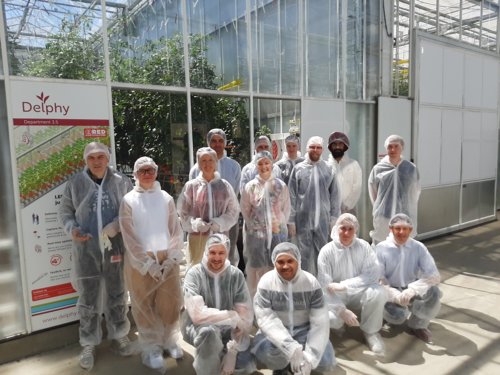From researcher to tomato picker. The career switch of two Plantenna researchers
With the start of the Plantenna research program, several sensing-based projects emerged. One of these was the development of a new ultrasound sensor for detecting plant stress inside the plant. Satadal Dutta and Gerard Verbiest’s promising results using this sensing method culminated in a paper and a patent. Now, Berend and Thijs have the task to bring this technology to market with their start-up Plense Technologies.
Authors: Berend de Klerk and Thijs Bieling

The Development of a new sensor
Dutta and Verbiest showed how ultrasound sensing could measure xylem vessels (the water carrying arteries) of plants. We, Berend and Thijs, joined their team little over a year ago as we started our master thesis. During this time, we tested the sensor in a noisy, commercial environment. After working out some flaws during the initial testing, it was time to demonstrate the sensor.
From research to market
From July-September 2022, a field-test of multitude of Plantenna sensors was carried out in a greenhouse at Delphy in Bleiswijk. The test-cell in the greenhouse was loaded with different sensors that could measure ultrasound emissions, water content in soil and leaves, temperature profiles, irradiation from the sun and stomatal aperture (the opening of pores on the leaves of the plants). These sensors used here included commercial sensors and innovative new sensors developed by the 4TU universities. The researchers from the Plantenna team combined their knowledge and together they tested the tomato plant's response to drought and changes in environmental conditions. One of these novel sensors was our ultrasound microphone. We are now on a journey to bring this ultrasound sensor to the market in the form of a start-up: Plense Technologies.
Plense Technologies will focus on delivering a smart ultrasound-based monitoring device for crops. During the final stages of our studies, we already explored the business potential of the technology by talking to various potential customers and writing an early-phase business plan. With funding from the NWO we now have the challenge to validate our product and find the so-called beachhead market; the first market to enter to get some traction before growing your business.
We have started the exploration of challenges within the agricultural sector, keeping in mind the solution our new sensor technique may provide. One of the initial key points is the estimation of water content inside the plant itself, allowing the farmers of the future to monitor the irrigation needs of the plant efficiently and accurately. Simultaneous to the validation process, we are improving our prototype sensor, for example by creating data on-demand.
Finding a problem-solution fit
At YES!Delft, the startup incubator of the TU Delft, there is a saying: “stop making, start validating”. Knowing the enthusiasm of the students, they know that the students will not actually stop making. However, for us it is a clear indication that once a technology works, it doesn’t immediately become a product that people buy. Assumptions are often wrong and therefore need to be validated. To know the challenges from our potential customer, you need to become familiar with their workflow. We have therefore decided to volunteer at breeding companies for several weeks, to observe their work and see where the problems are. Quite the career switch!



